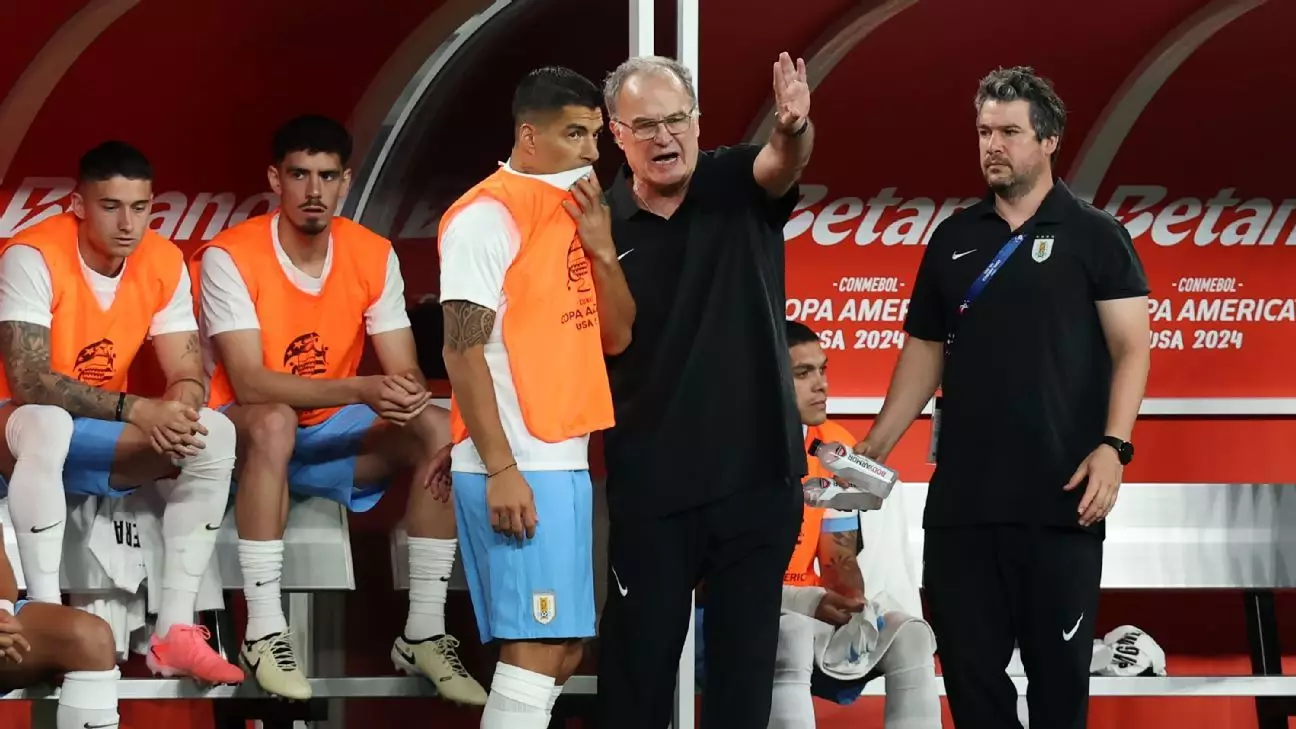The football world often romanticizes team dynamics and the interpersonal relationships between players and coaches, viewing these factors as vital to achieving victory. However, even the most illustrious teams can find themselves in disarray, as highlighted by recent statements from Luis Suárez regarding conditions under head coach Marcelo Bielsa during the 2024 Copa América. Suárez’s reflections not only emphasize the pressures endured by the players but also raise essential questions about coaching philosophies and the human elements of professional sports.
Bielsa, who took over the reins of the Uruguay national team in May 2023, is known for his unconventional methods and unyielding dedication to regimented structure. It’s this structure that has reportedly created a palpable divide between the players and staff within the Celeste Complex. Suárez pointedly expressed his discontent: “At the Celeste Complex, employees are not allowed to come in and greet us and eat with us.” His words outline a culture shift that diverges from the collaborative spirit often embraced in sports. This segmentation could be detrimental, fostering an atmosphere of isolation rather than camaraderie.
Moreover, Suárez’s mention of Matías Vecino leaving the national team without clear communication exemplifies the unnoticed human collateral damage that can occur in the wake of assertive coaching strategies. Patterns of discontent are often precursors to larger disruptions within a team, and failing to foster an environment anchored in trust and transparency can lead to negative repercussions both on and off the pitch.
Central to Suárez’s grievances was the breakdown of communication. He noted numerous instances during the Copa América where even a simple greeting from Bielsa was absent. A team thrives on its ability to communicate openly; without this, it risks becoming an entity that operates in silos. Suárez lamented, “Many players held a meeting to ask the coach to at least say good morning to us, but he didn’t even say hello.” This illustrates a severe disconnect between Bielsa’s directive approach and the emotional needs of the players, who seek acknowledgment and affirmation from their leader.
The fallout from such gaps in communication can be substantial. Cohesion on the field is often born from strong relationships off it, and when players feel alienated from their coach and by extension from each other, it can affect teamwork and performance. Even though La Celeste achieved a respectable third-place finish, there remains a sense of turmoil that stretches beyond the scoreboard.
The paradox that manifests from the current state is stark; Uruguay’s tangible success juxtaposes a mounting psychological burden. While they managed to secure third place in the Copa América, Suárez paints a less-than-rosy picture behind the scenes. “Bielsa gives a conference and talks wonderful things about people,” he said, revealing the inconsistency between his words and actions. A coach’s public persona can markedly differ from their private interactions, potentially leading to disillusionment among players who prefer authenticity in leadership.
This tension is further exacerbated by Suárez’s retirement and his subsequent reflections on his tenure. Tying his legacy to his past experiences suggests a larger story about the implications of leadership styles on player mentalities. Suárez urged fans to reserve judgment: “I ask people not to take it out on the players if something goes wrong.” Here, we see a burgeoning concern that fan loyalty might fray as results fluctuate amidst internal discord.
As Uruguay prepares for the upcoming 2026 World Cup qualifiers, the framework established by Bielsa will be tested further. Suárez’s poignant messaging calls for a culture of understanding in the face of adversity. The players are facing a multi-dimensional battle; not only do they contend with their opponents, but they must also navigate the complexities of an evolving team dynamic.
The situation facing the Uruguay national team underscores a critical truth about high-level sports: success is inherently tied to the psychological environment cultivated by leadership. As the next chapter unfolds for La Celeste, it becomes imperative for all stakeholders—players, coaching staff, and fans—to prioritize unity, empathy, and an unwavering commitment to the collective goal of achieving greatness.


Leave a Reply